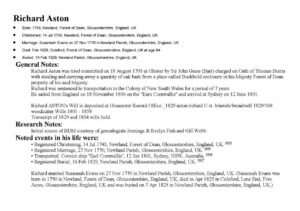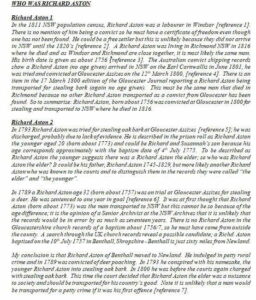Robert Jones was born in 1779 in Longhope in the Forest of Dean near the Herefordshire border where he worked as a butcher. He married Mary Munn (b1784) in Woolhope on 3 August 1807 and had 8 children: Ann (b1809), Thomas (b1811), Mary (b1813), John (b1814), Mary and Elizabeth (baptised 1816), Robert (b1819) and Jane (b1820).
On 3 June 1823, at the age of 44, Jones was sentenced to death which was then commuted to transportation for life for the theft of one steer and two heifers owned by Thomas Nelmes of Yarleton Farm, Longhope. After a spell on the hulk, Justitia, he was transferred to the Countess of Harcourt which set sail for New South Wales on 23 March 1824 arriving on 12 July 1824. The Gloucester penitentiary and onboard surgeon described his behaviour as orderly.
Jones was initially assigned to John Bingle, an explorer, general merchant, shipowner, farmer, magistrate and a member of the colonial elite. Jones was then assigned to work for a wool magnate, Hannibal Hawkins Macarthur, until he died in 1852. Hannibal Macarthur was the nephew of the famous John Macarthur, also a member of the colonial elite and father of Australia’s merino sheep industry.
Jones married Elizabeth Smith on 20 June 1831. Smith was born in 1782/83 in Caithness in Scotland. She was sentenced to be transported for seven years at the Lancashire Quarter Sessions on 2 February 1824. She departed England on the ship Midas in 1825. She obtained her Certificate of Freedom on February 1831.
Jones was given a ticket of leave on 11 March 1833 and a conditional pardon on 1 August 1839. He received a Royal Free Pardon on 16 January 1850. The latter enabled him, if he wished, to return to England. However, he remained in Australia working for Hawkins Macarthur.
The census of 1828 shows him living in the household of Hannibal Macarthur in Parramatta. The census of 1841 shows he is still in the Parramatta district with Elizabeth but no children.
Robert Jones died on 28 Sept 1852 in Parramatta, New South Wales. Elizabeth Smith died in 1861 and is buried in the same cemetery as her husband.
In 1835, Robert Jones’s son Thomas was transported for stealing 8s 6d from James Smith in his home village of Much Marcle in Herefordshire.
Thanks to Trish Pinder from Adelaide who provided much of this information. Trish is a direct descendant of Robert Jones and Mary Munn.

